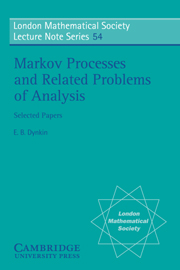Book contents
- Frontmatter
- Contents
- Preface
- I Markov processes and related problems of analysis (RMS 15:2 (1960) 1–21)
- II Martin boundaries and non-negative solutions of a boundary value problem with a directional derivative (RMS 19:5 (1964) 1–48)
- III Boundary theory of Markov processes (the discrete case) (RMS 24:2 (1969) 1–42)
- IV The initial and final behaviour of trajectories of Markov processes (RMS 26:4 (1971) 165–185)
- V Integral representation of excessive measures and excessive functions (RMS 27:1 (1972) 43–84
- VI Regular Markov processes (RMS 28:2 (1973) 33–64)
- VII Markov representations of stochastic systems (RMS 30:1 (1975) 65–104)
- VIII Sufficient statistics and extreme points (Ann. Prob. 6 (1978) 705–730)
- IX Minimal excessive measures and functions (Trans. AMS 258 (1980) 217–244)
IX - Minimal excessive measures and functions (Trans. AMS 258 (1980) 217–244)
Published online by Cambridge University Press: 18 March 2010
- Frontmatter
- Contents
- Preface
- I Markov processes and related problems of analysis (RMS 15:2 (1960) 1–21)
- II Martin boundaries and non-negative solutions of a boundary value problem with a directional derivative (RMS 19:5 (1964) 1–48)
- III Boundary theory of Markov processes (the discrete case) (RMS 24:2 (1969) 1–42)
- IV The initial and final behaviour of trajectories of Markov processes (RMS 26:4 (1971) 165–185)
- V Integral representation of excessive measures and excessive functions (RMS 27:1 (1972) 43–84
- VI Regular Markov processes (RMS 28:2 (1973) 33–64)
- VII Markov representations of stochastic systems (RMS 30:1 (1975) 65–104)
- VIII Sufficient statistics and extreme points (Ann. Prob. 6 (1978) 705–730)
- IX Minimal excessive measures and functions (Trans. AMS 258 (1980) 217–244)
Summary
ABSTRACT. Let H be a class of measures or functions. An element h of H is minimal if the relation h = h1 + h2, h1, h2 ∈ H implies that h1, h2 are proportional to h. We give a limit procedure for computing minimal excessive measures for an arbitrary Markov semigroup Tt in a standard Borel space E. Analogous results for excessive functions are obtained assuming that an excessive measure γ on E exists such that Tf = 0 if f = 0 γ-a.e. In the Appendix, we prove that each excessive element can be decomposed into minimal elements and that such a decomposition is unique.
Introduction.
In 1941 R. S. Martin [13] published a paper where positive harmonic functions in a domain D of a Euclidean space were investigated. Let H stand for the class of all such functions subject to condition f(a) < ∞ where a is a fixed point of D. Martin has proved that:
(a) each element of H can be decomposed in a unique way into minimal elements normalized by the condition f(a) = 1;
(b) if the Green function of the Laplacian in D is known, then all minimal elements can be computed by a certain limit process.
J. L. Doob [2] has discovered that the Martin decomposition of harmonic functions is closely related to the behaviour of Brownian paths at the first exit time from D. G. A. Hunt [9] has shown that, using these relations, it is possible to get Martin's results by probabilistic considerations. Actually only discrete Markov chains were treated in [1] and [5], however, the methods are applicable to Brownian motion as well.
- Type
- Chapter
- Information
- Markov Processes and Related Problems of Analysis , pp. 285 - 312Publisher: Cambridge University PressPrint publication year: 1982



